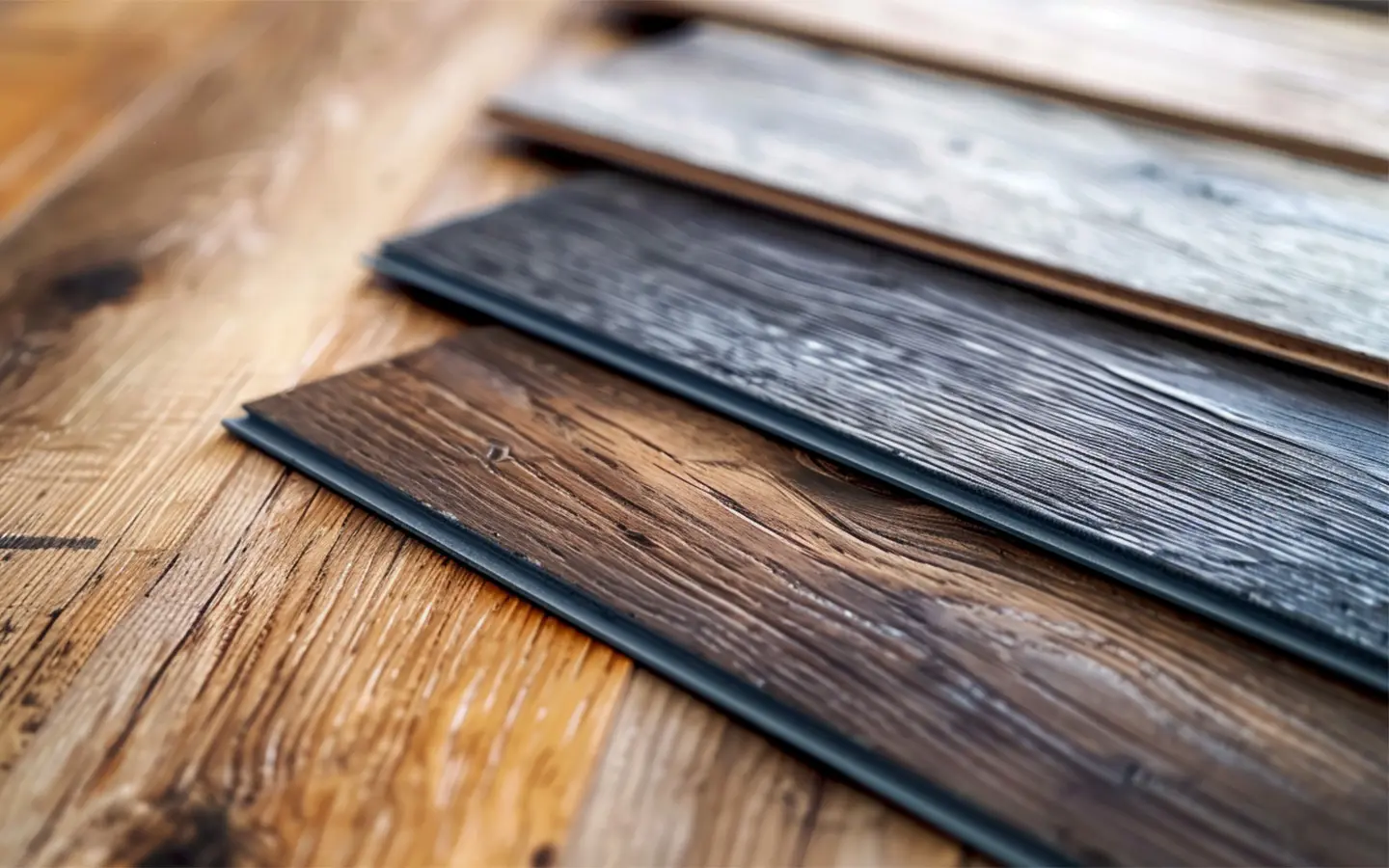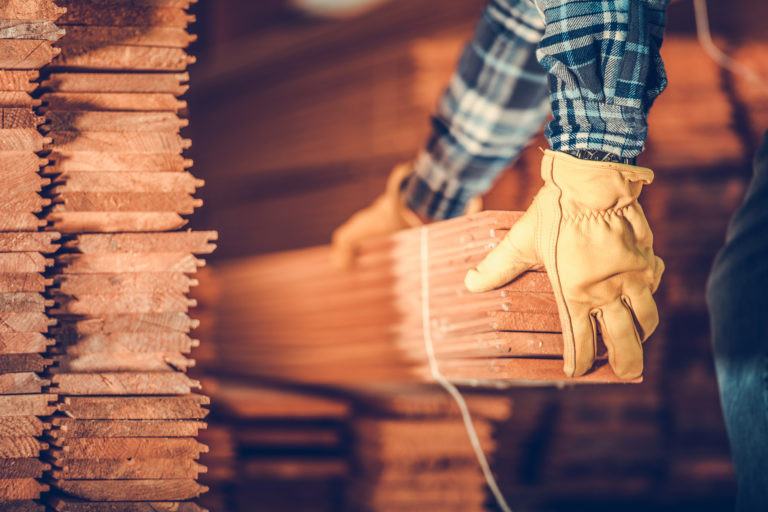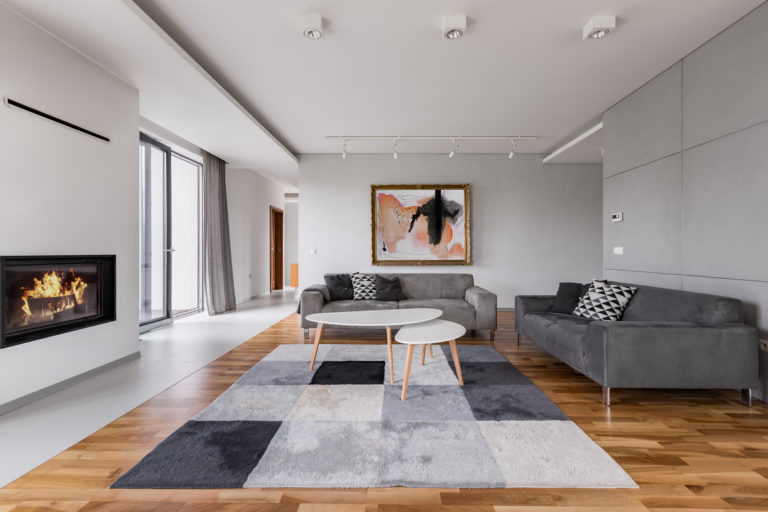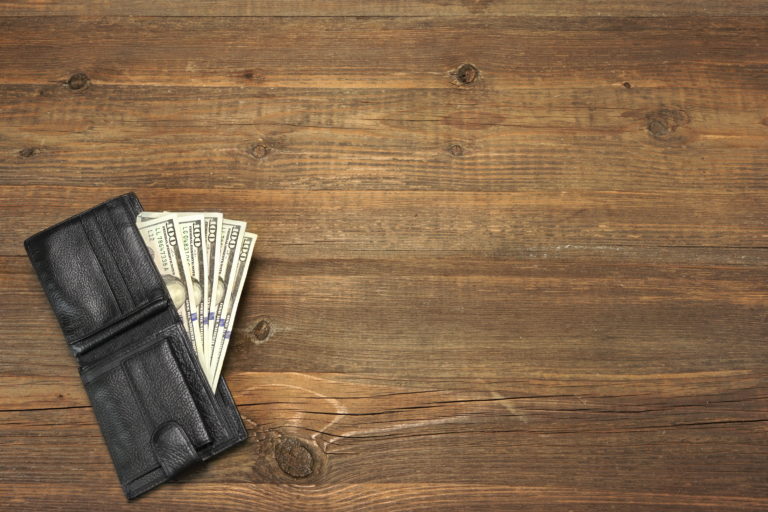When considering flooring options, LVP (Luxury Vinyl Plank) and hardwood often go head-to-head, sparking debates among homeowners.
Both are popular for their aesthetic appeal and durability, but many people ask: Is LVP merely a choice for those who can’t afford hardwood? Or does it stand as a formidable option on its own merit?
So let’s compare both in detail—LVP vs. hardwood flooring—and see which one is a better fit for your home.
Styles and Variations
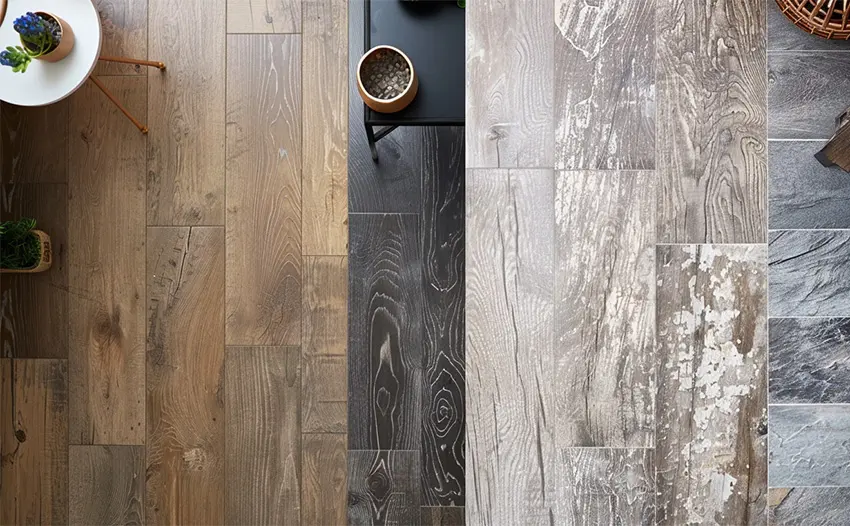
When you’re looking at LVP and hardwood, you’ve got a bunch of choices on both sides.
Starting with LVP, you can find it in a bunch of looks, ranging from wood to stone. The cool part is that it can mimic these textures so well that you have to look twice to tell it’s not real wood or stone. You’ve got options in colors, finishes (like matte or shiny), and even plank sizes, which is great for customizing your space exactly how you want it.
Now, hardwood is all about that natural vibe. It comes from different types of trees, which means the look can vary a lot. You have classics like oak, maple, and cherry, which are popular for their traditional looks and durability.
But then there are also exotic woods like bamboo (technically a grass, but it’s often lumped in with hardwood), mahogany, and teak, which offer unique colors and grain patterns. With hardwood, you also get to choose between different finishes and whether you want your floors prefinished or finished after installation, which affects the overall look.
Impact on Home Resale Value: Hardwood vs LVP
The choice between LVP and hardwood flooring can make a significant difference when it comes to boosting your home’s resale value.
Generally, hardwood floors are seen as a premium upgrade that can increase the attractiveness and value of your home to potential buyers. They bring a classic, timeless appeal that many people love, not to mention the natural warmth and character they add to any space.
Because of this, homes with hardwood floors often list and sell for more. Buyers tend to appreciate the durability and the option to refinish hardwood floors over time, which can extend their life and allow for customization to suit personal tastes.
LVP, while durable and versatile in its appearance, doesn’t usually boost home resale value in the same way hardwood does. It’s seen as a practical, cost-effective flooring choice, especially appealing to those looking for low maintenance and high durability.
However, it’s important to note that high-quality LVP in modern designs can still make a strong, positive impression on buyers, particularly those prioritizing functionality and style within a budget.
LVP can mimic the look of hardwood closely, and with the right design, it can enhance the home’s appeal to potential buyers.
In summary, if you’re renovating or updating your floors primarily for resale value, hardwood is typically the stronger investment. But if your focus is on balancing cost, durability, and style for your own use in the near term, LVP offers a lot of flexibility and practical benefits that shouldn’t be overlooked.
Each choice has its merits, depending on your priorities, budget, and how long you plan to stay in your home before selling.
Best Brands of 2024
Cost Comparison: LVP vs Hardwood
When it comes to choosing between luxury vinyl plank and hardwood flooring, the cost is a deal-breaker for many homeowners.
From what we’ve found, LVP generally presents a more affordable option both upfront and in terms of long-term maintenance.
For the initial costs, LVP flooring ranges from $2 to $7 per square foot, making it a cost-efficient choice for those on a budget. The installation of LVP is also less expensive, with professional installation costs ranging from $1 to $4 per square foot.
This affordability is partly due to the ease of installation that LVP offers, including options for floating floors that snap together or peel-and-stick planks, which can even be a DIY project for those inclined.
Hardwood flooring, in contrast, has a higher initial cost, ranging from $6 to $14 per square foot. Installation costs add more to the expense, with hardwood installation fees ranging between $3 and $10 per square foot.
The installation of hardwood floors is more complex and time-consuming, often necessitating professional installation, which adds to the total cost.
Long-term maintenance also differs between the two.
Hardwood floors require refinishing every 7 to 10 years, which can cost between $3 and $5 per square foot, adding to the total ownership cost over time.
LVP, on the other hand, doesn’t need refinishing due to its durable wear layer. However, if damage occurs, such as deep gouges, individual planks may need replacing, which could vary in cost depending on the product and labor charges.
Ultimately, while LVP offers a more budget-friendly and low-maintenance option with a wide range of styles that mimic the look of real wood, hardwood floors provide timeless beauty, the potential for increasing property value, and the charm that only real wood can offer.
VOCs and Environmental Care
When considering the environmental impact and indoor air quality of flooring options, the topic of volatile organic compounds (VOCs) is crucial.
VOCs are chemicals found in many building materials, including flooring, that can evaporate into the air at room temperature and potentially cause health issues, from eye, nose, and throat irritation to more serious conditions like liver, kidney, or central nervous system damage. Some VOCs have been associated with an increased risk of cancer.
Luxury vinyl plank flooring has been a point of concern regarding VOC emissions.
The synthetic materials used in the manufacturing of LVP, such as PVC, can off-gas VOCs into indoor environments. However, advancements in manufacturing and stricter regulations have led to the production of low-VOC and VOC-free LVP options.
Many manufacturers now adhere to standards like FloorScore certification, which ensures that products meet strict indoor air quality requirements.
On the other hand, hardwood flooring is often celebrated for its environmental friendliness, especially when sourced from sustainably managed forests. Hardwood floors are made from natural materials that, overall, emit lower levels of VOCs compared to synthetic flooring options.
Additionally, the longevity of hardwood floors means they don’t need to be replaced as frequently as other types of flooring, reducing the environmental impact over time. However, the finishes and adhesives used in hardwood flooring installation can also emit VOCs, so it’s essential to look for low-VOC or VOC-free options when choosing these materials.
Both LVP and hardwood flooring can be environmentally friendly choices when selected and installed with care for VOC emissions and overall environmental impact.
Advice regarding VOC care: Opting for flooring options certified by reputable environmental standards, using low-VOC adhesives and finishes, and ensuring proper ventilation during and after installation can help minimize exposure to harmful chemicals.
Refinishing and Repair
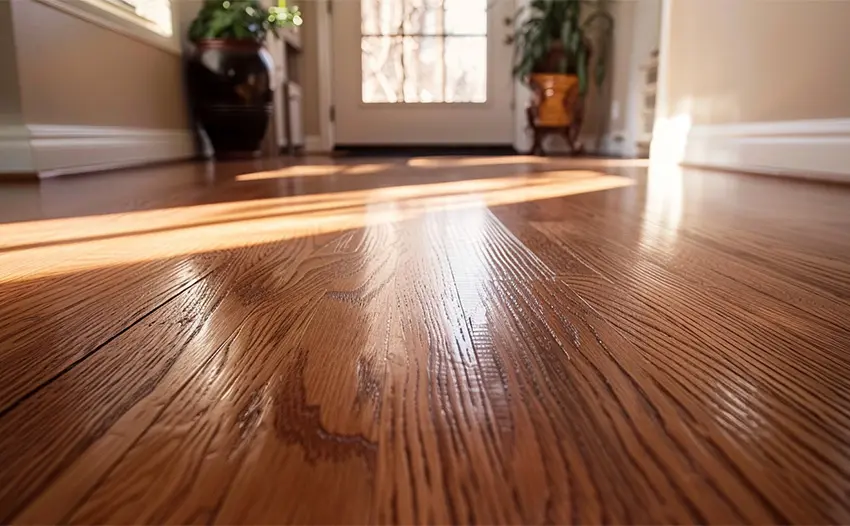
Refinishing and repairing floors are two important aspects to consider for the longevity and appearance of your flooring, whether you have Luxury Vinyl Plank (LVP) or hardwood.
Refinishing: Hardwood vs LVP
Hardwood floors are known for their ability to be refinished multiple times throughout their lifespan.
Refinishing involves sanding down the surface to remove the old finish, any scratches, dents, or imperfections, and then applying a new finish. This process can significantly extend the life of your floors, restore their beauty, and adapt them to new interior styles.
The ability to refinish hardwood floors means they can last for decades, even generations, with proper care. However, the process can be labor-intensive and requires professional skill to achieve the best results.
On the other hand, LVP cannot be refinished.
Once the wear layer has been damaged or worn down, the plank needs to be replaced. The wear layer’s durability varies by product quality, with thicker wear layers offering more protection and longevity.
While the inability to refinish LVP might seem like a drawback, the flooring is designed to be highly durable and resistant to daily wear and tear. For damaged planks, the replacement process is relatively straightforward and can often be done without replacing the entire floor.
Repairs: Hardwood vs LVP
Hardwood floors can be repaired through a variety of methods, depending on the extent of the damage.
Minor scratches can often be buffed out or covered with a touch-up marker. More significant damage, such as deep scratches or gouges, might require filling with wood putty and refinishing the affected area. In cases of severe damage, individual boards can be replaced without the need to redo the entire floor.
LVP is also capable of being repaired, but the method differs.
For minor scratches, some manufacturers offer repair kits specifically designed for LVP. In the case of more significant damage, like deep cuts or gouges, the affected plank can usually be removed and replaced with a new one.
This process is made easier by the floating floor installation method that is common with LVP, which allows for individual planks to be lifted out and replaced without disturbing the rest of the floor.
In summary, while hardwood floors offer the advantage of being refinable, requiring more intensive maintenance over time, LVP provides ease of replacement for damaged areas without the option of refinishing.
Scratch Resistance: LVP vs Hardwood Flooring
Luxury vinyl plank flooring is known for its high scratch resistance, making it an ideal choice for homes with pets, children, or high-traffic areas.
The top layer of LVP, known as the wear layer, is specifically designed to resist scratches, stains, and wear, providing a durable surface that maintains its appearance over time. The thickness of the wear layer varies across different quality levels of LVP, with thicker wear layers offering better protection.
Hardwood floors, while beautiful and timeless, are more susceptible to scratches and dents. The degree of scratch resistance can vary significantly depending on the species of wood, with harder woods being more resistant than softer ones.
Finishes applied to hardwood floors can also enhance scratch resistance, but they will inevitably show signs of wear over time, especially in high-traffic areas or homes with pets. However, the ability to sand and refinish hardwood floors allows for the removal of scratches and the restoration of the floor’s appearance.
Maintenance: LVP vs Hardwood
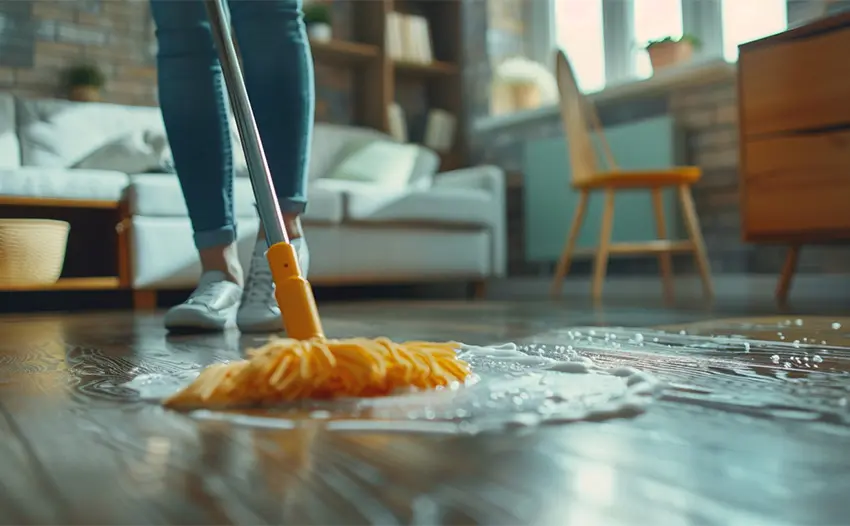
Maintenance of LVP flooring is relatively low compared to hardwood. Regular sweeping or vacuuming to remove dirt and debris, along with occasional mopping using a mild cleaner, is usually sufficient to keep LVP floors looking new.
LVP is also water-resistant, making it easier to clean up spills without worrying about damage.
Hardwood floors require more maintenance to preserve their beauty and longevity. Regular sweeping, dust mopping, or vacuuming is necessary to remove grit and dirt that can scratch the surface. Spills should be wiped up promptly to prevent water damage.
Hardwood floors also benefit from periodic refinishing, which involves sanding down the surface and applying a new finish, to maintain their appearance and durability over time.
In summary, if scratch resistance and ease of maintenance are top priorities, LVP might be a more suitable choice. It offers durability and ease of care that are hard to beat.
However, for those who prefer the natural beauty and warmth of real wood and are willing to put in the effort for its upkeep, hardwood flooring remains a popular choice despite its higher maintenance needs.
Room Suitability: Hardwood or LVP?
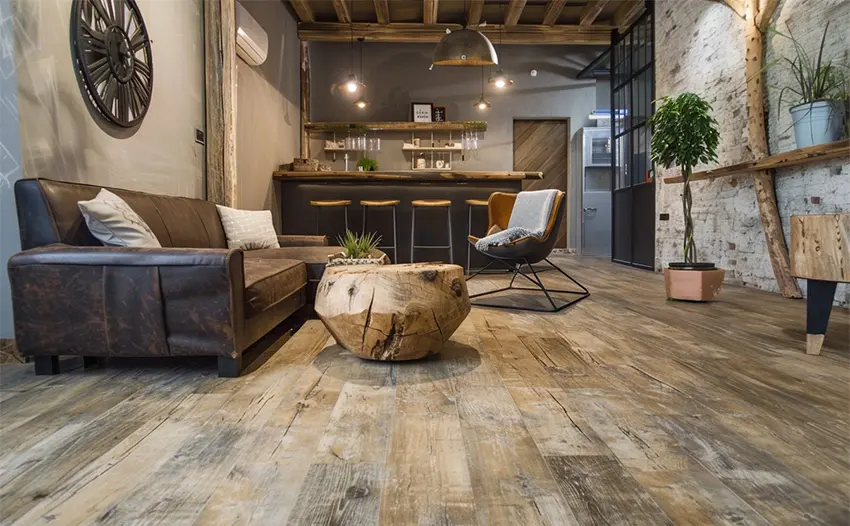
When choosing flooring for different rooms and areas in your home, including basements, the suitability of LVP and hardwood can vary significantly based on the environment and usage of each space.
Living Rooms and Bedrooms
Hardwood: Traditionally, hardwood has been a popular choice for living rooms and bedrooms due to its warmth, comfort underfoot, and the classic, elegant appearance it lends to these spaces. Hardwood flooring can add significant value and aesthetic appeal, enhancing the overall ambiance of these areas.
LVP: LVP is also a suitable option for living rooms and bedrooms, especially for those seeking a more durable, low-maintenance alternative to hardwood. With advancements in technology, LVP now offers a wide range of designs that closely mimic the look of real wood, making it a versatile and practical choice for these areas.
Kitchens and Bathrooms
Hardwood: Hardwood is less commonly used in kitchens and bathrooms due to its susceptibility to moisture, which can cause warping, swelling, and other water-related damages. While certain sealants can help protect hardwood floors in these environments, they require more maintenance and care to ensure longevity.
LVP: LVP is highly suited for kitchens and bathrooms because of its superior water resistance. Unlike hardwood, LVP can handle spills, moisture, and humidity without warping or being damaged, making it an ideal choice for these wet areas. Its ease of cleaning and durability also add to its suitability for high-traffic kitchen spaces.
Basements
Hardwood: Hardwood is generally not recommended for basements due to the high moisture levels commonly found in these areas. Basements are prone to dampness and fluctuations in humidity, which can be detrimental to hardwood floors, leading to warping and mold issues.
LVP: LVP, on the other hand, is an excellent choice for basements. Its water resistance and durability make it capable of withstanding the humid, moisture-prone conditions of basement environments. Additionally, LVP’s ease of installation over concrete subfloors makes it a convenient option for basement renovations or updates.
Utility Areas and Mudrooms
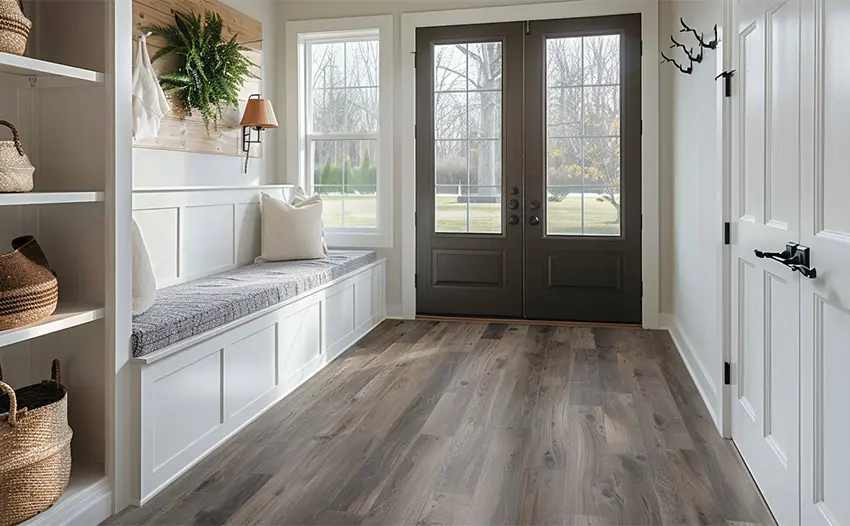
Hardwood: These high-traffic, moisture-prone areas are typically not the best fit for hardwood flooring due to the risk of damage from water, mud, and grit brought in from the outdoors. Maintaining the appearance and condition of hardwood in these environments can be challenging.
LVP: For utility areas and mudrooms, LVP is a superior choice. Its resistance to moisture and easy-to-clean surface make it ideal for standing up to the rigors of daily use in these spaces. LVP can handle the dirt, spills, and humidity common in these areas without compromising on style or durability.
In summary, the choice between LVP and hardwood depends greatly on the specific needs and conditions of each room in your home.
While hardwood offers a timeless elegance ideal for living spaces and bedrooms, LVP provides a practical, durable solution for kitchens, bathrooms, basements, and utility areas, offering the look of wood without the susceptibility to moisture and wear.
FAQ
Q: Can LVP be installed over existing flooring?
A: Yes, one of LVP’s advantages is its ability to be installed over many existing floors, simplifying the installation process.
Q: How long does hardwood flooring last compared to LVP?
A: Hardwood can last for decades with proper care, potentially outliving LVP, which, while durable, may not have the same lifespan due to its non-refinable nature.
Q: Are there eco-friendly options for both hardwood and LVP?
A: Yes, for hardwood, look for FSC-certified options. For LVP, seek out products made from recycled materials and those that meet environmental standards.
Conclusion
We hope this article has provided you with valuable insights into the distinct characteristics, benefits, and considerations of hardwood flooring versus luxury vinyl plank (LVP) flooring.
Our goal was to equip you with the knowledge needed to make an informed decision that aligns with your lifestyle, aesthetic preferences, and budgetary requirements.
Whether you’re drawn to the timeless elegance and natural beauty of hardwood floors or the practical durability and moisture resistance of LVP, your choice will significantly impact your home’s look, feel, and functionality.
About The Author

Daniel Meeks
February 17, 2024
Daniel Meeks is a flooring expert with over 10 years of experience in the industry. Holding a BS in Marketing from Emerson College, Daniel has spent his professional career writing for some of the biggest names in interior design. In his spare time, Daniel enjoys hiking, baking, and hanging out with his dog, Artie.
